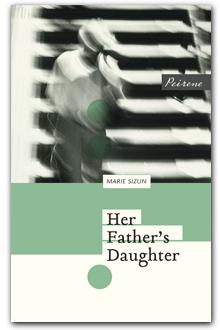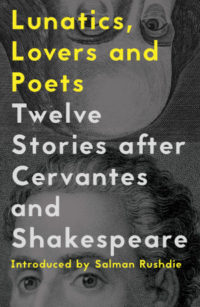Recent reads round-up
I read a few good books in a row and then went on holiday before writing reviews or even notes on them and now it’s two weeks since I finished the last of them. Oops. So here is my attempt to remember what I enjoyed about them. They’re all great!
 Her Father’s Daughter
Her Father’s Daughter
by Marie Sizun
translated from French by Adriana Hunter
I loved this book. It is simple and sparse and yet utterly moving. This seems to be a pattern with Peirene books, one that I approve of. The story is told from the perspective of “the child” (she does have a name but it’s rarely used) – a young girl living in Paris during the Second World War. She is the apple of her mother’s eye and despite the Nazi occupation is utterly happy in her little world. Then the father she has never met comes home from the POW camp and the fight for affection begins.
Sizun brilliantly depicts the changing relationships – between mother and child; between father and child; between mother and father; between grandmother and child – against a backdrop of the occupation of Paris ending, and then the war itself ending. Though the child is not the narrator, her perspective filters the story to its essential parts. This at times almost reads like poetry, it’s so distilled. But it isn’t at all abstract in the way that poetry can be. A beautiful, quick read.
“She hears the sound of a key in the lock: her mother is home. The child is so bursting with happiness that her voice is strangulated as she calls, as she cries out, in her frantic longing to see her mother, straight away, quicker, now. The mother laughs…What the child hears is life coming back, the movement, music and fragrance of life coming home…She’s on her mother’s lap, she’s reunited with her mother’s smell and her warmth, she’d like to become a part of the mother’s body, to hold her so close and so hard that she can never go away again. Ever.”
Le père de la petite published 2005 by Éditions Arléa.
This translation published 2016 by Peirene Press.
Source: I subscribe to the publisher.
 Lunatics, Lovers and Poets: Twelve Stories After Cervantes and Shakespeare
Lunatics, Lovers and Poets: Twelve Stories After Cervantes and Shakespeare
edited by Daniel Hahn and Margarita Valencia
This collection of short stories was produced to honour the 400th anniversary of the deaths of Shakespeare and Cervantes (who died on the same day, not just the same year). There are 12 stories, half written originally in Spanish, half in English, and two editions have been produced, one in English and one in Spanish. It’s a mixed bunch, but they’re all good, to varying degrees. The references to Shakespeare and Cervantes vary in how subtle or obvious they are, and how literal.
“Opening windows” by Marcos Giralt Torrente (translated by Samantha Schnee) is about teenagers putting on a play that is painfully close to the truth for the lead actor’s family, and has clear echoes of Hamlet. “Shakespeare, New Mexico” by Valeria Luiselli (translated by Christina MacSweeney) is about a family of re-enactors who move to a ghost town to act the part of Wild West characters, repeating the same tired old scenes over and over.
My favourite of the bunch is actually the first, “Don Quixote and the ambiguity of reading” by Ben Okri. Its story is simple, if very meta: Don Quixote and Sancho visit a printing press in modern Nigeria where their story is being printed. It is a treatise on reading, fame and what we are remembered for, and there is a perfect quote on every page. Not only that, but despite its uneventful story based on a book I’ve never read, it took me on real emotional journey of laughter and tears and heartache. It made me question my very perspective on life and memory. That’s pretty impressive in 20 pages. I clearly need to read more Okri.
“Let it be said, while I have breath, that he made us more imaginative, just by being himself. I had never felt more locked in the box of my possibilities than in the presence of that man. He was a call to greatness. We failed to take up that challenge, cowards that most of us are…Life passes. And it is only the fires that your life lit in other people’s souls that count…There are some people one should never have met, because they introduce into your heart an eternal regret for the greater life you did not live.”
English edition published 2016 by And Other Stories.
Spanish edition published 2016 by Galaxia Gutenberg.
Source: I subscribe to And Other Stories.
 Chéri
Chéri
by Colette
translated from French by Roger Senhouse
Chéri is one of Colette’s better known works, so I already knew the rough storyline before finally reading this, but as always her language is as much the attraction as her stories. Chéri is an attractive wealthy young man who has been coached for six years in the art of love by middle-aged courtesan Léa. Now it’s time for Chéri to marry a suitable young lady, and in parting ways, both he and Léa must face their true feelings for one another, which have long been a source of irony and gentle rebuffs. The story is told by Léa, who also has to face the reality of her age and the possibility that she can no longer attract beautiful young men. But does she even want to?
Despite the complete unfamiliarity of the classy Parisian setting, what really strikes me about this book is the familiarity of the emotions being felt. We all lie to ourselves about some relationships and we all fear ageing to some degree. This book doesn’t have the charm of the Claudine series, but it feels more honest, perhaps because of Léa’s age giving her more perspective and wisdom. But Léa can also be vicious in her assessment of others, particularly older ladies in her circle, which is both delicious fun and a horrifying portrait of her own imminent future.
“Perhaps 70 years of age, with the corpulence of a eunuch held in by stays, old Lili was usually referred to as ‘passing all bounds’, without these ‘bounds’ being defined…A little blue jersey gaped over her skinny bosom crinkled like the wattles of a turkey-cock; a silver fox failed to conceal the neck, which was the shape of a flower-pot and the size of a belly. It had engulfed the chin.”
First published in French in 1920.
This translation first published in 1949.
Source: Secondhand, but I really don’t remember where from. I’ve been collecting Colette books since a colleague at my old workplace in Oxford recommended her to me 11 years ago.